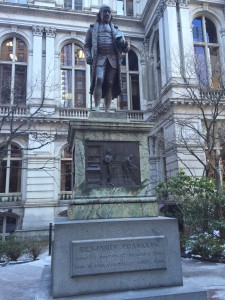“Beer is proof that God loves us and wants to be happy” This quote is plastered all over taverns, tshirts, and beer mugs across America. It resonates with the working man or woman who enjoys unwinding with a cold one after a long days work. Perhaps one of the reasons it does so much is because it is attributed to possibly the ultimate self made working American, Benjamin Franklin. What most people do not know about this quote on their favorite tshirt is that is not exactly what Franklin stated.
Franklin, a oenophile, actually expressed his love for wine in a letter written in 1779 to Andre Morellet, a well known theologian, economist, and philosopher. In his letter, Franklin states “We hear of the conversion of water into wine at the marriage in Cana, as of a miracle. But this conversion is, through the goodness of God, made every day before our eyes. Behold the rain which descends from heaven upon our vineyards, and which incorporates itself with the grapes to be changed into wine; a constant proof that God loves us, and loves to see us happy.”
Works cited: https://www.anchorbrewing.com/blog/say-what-says-who-benjamin-franklin-on-beer-or-not/
